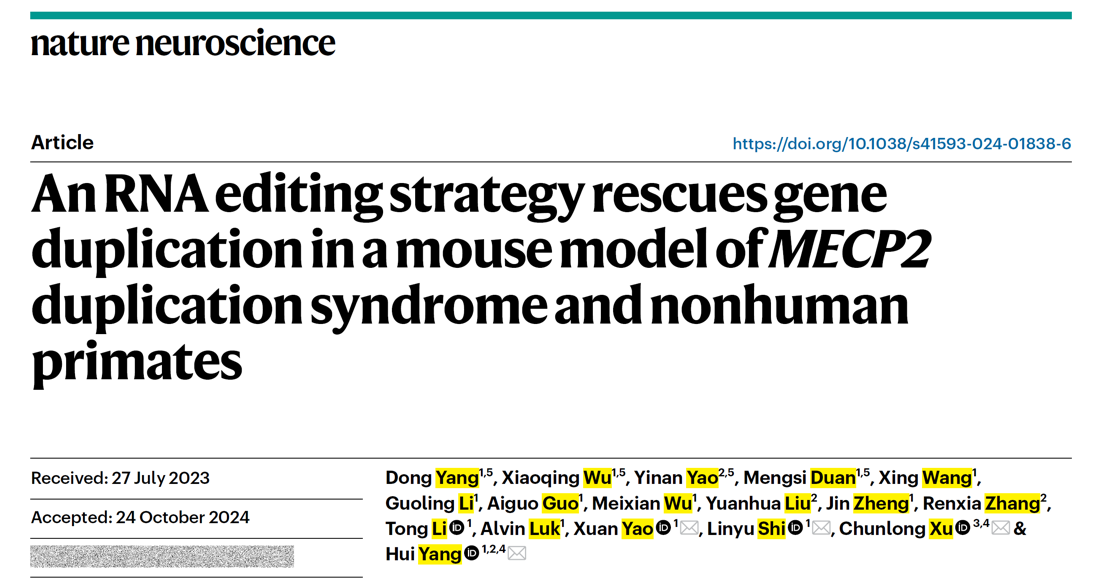Your privacy is very important to us. When you visit our website, please agree to the use of all cookies. For more information about personal data processing, please go to Privacy Policy.


HuidaGene Therapeutics Announces Landmark Publication in Nature Neuroscience Highlighting HG204’s Potential as First RNA-editing Therapy for MECP2 Duplication Syndrom
SHANGHAI and MIDDLETOWN (DE), December 12, 2024 –HuidaGene Therapeutics (“HuidaGene”), a global clinical-stage biotechnology company advancing programmable genome medicine, announced that its groundbreaking research results on HG204, a CRISPR RNA-editing therapy, has been published in Nature Neuroscience. The study was jointly conducted by HuidaGene, Shanghai Institute of Materia Medica, Chinese Academy of Sciences, and Lingang Laboratory, highlighting the preclinical research results of HG204 for MECP2 duplication syndrome (MDS), a rare and life-threatening neurodevelopment disorder.

HG204 uses HuidaGene’s proprietary AI-driven HG-PRECISE® platform to develop a novel high-fidelity CRISPR/Cas13Y (hfCas13Y) RNA-editing therapy delivered via a single adeno-associated viral (AAV) vector. This innovative approach can efficiently knock down MECP2 mRNA levels and exhibit minimal off-target effects, ensuring a safe and effective treatment option for MDS patients.
Prof. Hui Yang, Director of the Gene Therapy Center at Shanghai Institute of Materia Medica, Chinese Academy of Sciences, stated, “Our team pioneered the development of the Cas13X/Y RNA-editing system and published the results for the first time in Nature Methods 2021 (https://www.nature.com/articles/s41592-021-01124-4). Since then, we have further optimized and developed the high-fidelity hfCas13Y system published in Nature Biotechnology 2022 (https://www.nature.com/articles/s41587-022-01419-7). These studies have laid a technical foundation for the clinical application of the CRISPR/Cas13 system and provided important support for exploring the therapeutic potential of HG204.”
The publication details preclinical findings demonstrating that HG204 can precisely knock down MECP2 mRNA levels in mouse and non-human primate models, improved disease phenotypes, and prolonged survival without inducing adverse effects. These research data provide a strong foundation for ongoing clinical trials of HG204, the first CRISPR/RNA-editing therapy for MDS.
Linyu Shi, PhD., Chief Scientific Officer of HuidaGene, added, “HG204 is a testament to the power of RNA-editing technology. Using hfCas13Y, a high-fidelity and high-activity RNA-editing tool, we’ve developed a therapy capable of precisely targeting MECP2 mRNA, restoring its expression to normal physiological levels. This approach has shown remarkable preclinical efficacy and safety, establishing RNA editing as a viable platform for treating previously untreatable genetic disorders.”
Key highlights from the Nature Neuroscience:
·Mechanism of action: HG204 uses a single AAV vector to deliver hfCas13Y and guide RNAs, targeting MECP2 mRNA for degradation and reducing protein levels.
·Mouse models: HG204 restored MECP2 levels, improved motor and cognitive behaviors, prolonged survival, and restored abnormal gene expression to wild-type.
·Non-human primates: Intracerebroventricular administration distributed hfCas13Y throughout the brain, achieved dose-dependent MECP2 knockdown, and reduced cerebrospinal fluid potential biomarker GDF11, linked to MDS disease.
·Safety: Long-term assessments in both species confirmed no adverse events were observed, confirming the precision and safety of hfCas13Y.
·Therapeutic window: Efficacy was demonstrated in both neonatal and adult animal models, supporting clinical applicability across disease stages.
“MDS patients have long faced a severe lack of treatment options, with current care limited to managing symptoms,” said Alvin Luk, PhD, MBA, CCRA, CEO and Co-founder of HuidaGene. “Our Nature Neuroscience publication marks a significant milestone in our journey to deliver life-changing therapies to these patients. The first-in-human HERO trial has commenced, marking HG204 as the world’s first CRISPR/RNA-editing therapy for neurodevelopmental disease and bringing hope to families affected by MDS.”
Orphan Drug Designations:
HG204 has received triple designations: Orphan Drug Designation and Rare Pediatric Disease Designation from the U.S. Food and Drug Administration (FDA) and Orphan Drug Designation from the European Medicines Agency (EMA). These designations emphasize the unmet need and the therapy’s potential to transform MDS treatment.
About HuidaGene
HuidaGene utilizes its proprietary CRISPR-based HG-PRECISE® platform to develop potentially curative genome medicine. The Company is advancing clinical programs, including trials of HG004 (granted ODD & RPDD by FDA) ‘LIGHT’ trial (NCT06088992) and Phase 1/2 international, master-protocol ‘STAR’ clinical trial (NCT05906953) in RPE65-associated retinal disease, HG202 RNA-editing therapy ‘SIGHT-I’ first-in-human trial (NCT06031727) and ‘BRIGHT’ Phase 1 clinical trial (NCT06623279) for nAMD, HG204 RNA-editing therapy (granted ODD & RPDD by FDA and ODD by EMA) ‘HERO’ trial (NCT06615206) for MECP2 duplication syndrome, and HG302 DNA-editing therapy (granted ODD & RPDD by FDA) first-in-human ‘MUSCLE’ trial (NCT06594094) for DMD. The preclinical programs include HG303 DNA-editing for ALS and CRISPR RNA-editing therapy for Alzheimer’s and Huntington’s Disease. With an extensive intellectual property portfolio, HuidaGene is a leader in genome medicines for neurology and ophthalmology. Learn more at huidagene.com or on LinkedIn.
recommendations
-
Dec 12,2024
HuidaGene Therapeutics Initiates M.U.S.C.L.E. Clinical Trial of HG302 for Duchenne Muscular Dystrophy and Completes First Patient Dosed
-
Apr 11,2025
HuidaGene at CRISPR MEDiCiNE 2025: A Celebration of Progress, Promise, and Patients
-
Nov 04,2024
HuidaGene Therapeutics Receives the First-Ever FDA Clearance of CRISPR/Cas13 RNA-Editing HG202 for Macular Degeneration
-
Dec 06,2024
HuidaGene Therapeutics Announced First Patient Dosed in the HERO Clinical Trial of HG204 for MECP2 Duplication Syndrome

